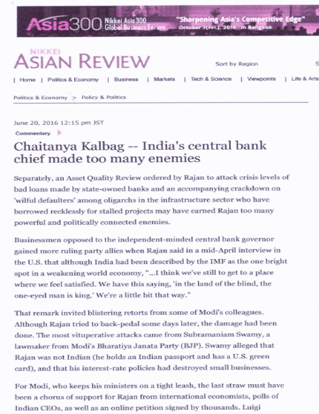India’s central bank chief made too many enemies (2)
Published date: 20th Jun 2016, Nikkie Asia Review
Separately, an Asset Quality Review ordered by Rajan to attack crisis levels of bad loans made by state-owned banks and an accompanying crackdown on ‘willful defaulters’ among oligarchs in the infrastructure sector who have borrowed recklessly for stalled projects may have earned Rajan too many powerful and politically connected enemies.
Businessmen opposed to the independent-minded central bank governor gained more ruling party allies when Rajan said in a mid-April interview in the U.S. that although India had been described by the IMF as the one bright spot in a weakening world economy, “…I think we’ve still to get to a place where we feel satisfied. We have this saying, ‘in the land of the blind, the one-eyed man is king.” We’re a little bit that way.”
That remark invited blistering retorts from some of Modi’s colleagues. Although Rajan tried to back-pedal some days later, the damage had been done. The most vituperative attacks came from Subramaniam Swamy, a lawmaker from Modi’s Bhartiya Janata Party (BJP). Swamy alleged that Rajan was not Indian (he holds an Indian passport and has a U.S. green card), and that his interest-rate policies had destroyed small businesses.
For Modi, who keeps his ministers on a tight leash, the last straw must have been a chorus of support for Rajan from international economists, polls of Indian CEOs, as well as an online petition signed by thousands. Luigi Zingales, a fellow professor of finance from the University of Chicago’s Booth School of Business, wrote last week that Rajan was being targeted because he had attacked crony capitalism, and called for a second term for the governor so he could complete his task.
N.R. Narayana Murthy, the billionaire technocrat who co-founded software giant Infosys, believes that the effects of Rajan’s exit will pass off because India’s economic fundamentals are strong.
“But what is more critical is: Will any other non-resident Indian come to India and take up an important responsibility if we start questioning their Indianness?” Murthy told the Nikkei Asian Review.
“We are in 2016. We cannot behave like we are in East India Company times. This is a time when we must solve our poverty; we must create ten million jobs every year; this is the time when the economy must grow at 10%. For that to happen we require intelligent people of Indian origin from all over the world. If you want to attract them, you have to make this country a hospitable place for them.”






